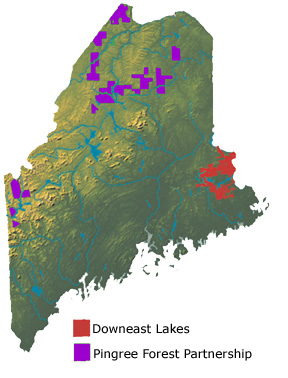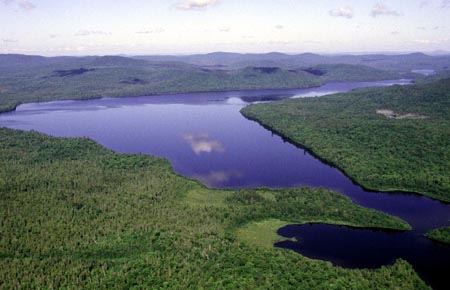For a Maine Family Business – ‘The Forest Comes First’
By: Amos S. Eno
Posted on:08/28/2012 Updated:08/30/2012The Pingree family uses a conservation easement to guarantee sustainability
Along with growing lots of trees on its 815,000 acres of forests in Maine, the Pingree family is busy growing jobs as well. At a time when the nation as a whole is searching for jobs and for long-term economic certainty, a seventh-generation family-owned forestry business established in 1841 is delivering certainty on both forest stewardship and jobs.
One key ingredient in this Maine success story, says Seven Islands Land Company President John McNulty, is that in 2001 the family agreed to put 762,192 acres of its Maine forestland into a conservation easement. This perpetual easement guarantees that the land can never be developed and will instead remain as tax-paying, job-generating forests.
Today, the Pingree Forest Partnership conservation easement continues to be the nation’s prime example of landscape-scale conservation. “I think the greatest thing about the easement,” McNulty explains, “is it created another tool to keep the family intact and on track by taking the issue of development entirely off the table.”

The Pingree family, McNulty says, is unanimous in supporting the family’s business goals to use “innovative, cost-effective and sustainable management practices” and to balance “the financial demands of ownership with the practice of sustainable forestry while demonstrating the highest levels of integrity, credibility and innovative practice.” Because of this family commitment, the conservation easement simply confirmed the family’s existing forest management practices. But thinking of other family ownership situations, McNulty says that with an easement in place, “You don't have one faction of the family saying there's got to be more value here, we'd better sell some lots or something like that to generate cash.”
McNulty notes that well before the 2001 conservation easement, the Pingrees demonstrated their commitment to forestry best management practices: “They’ve played a leadership role by being among the first to certify their forestlands as well-managed and for some time being the largest certified forest in the world. We dove into FSC [Forest Stewardship Council] certification in 1995.” He says that by first earning FSC “Well-Managed Forest” certification and then American Forest & Paper Association Sustainable Forestry Initiative (SFI) certification in 1999, the family’s Seven Islands Land Company “set a mark and other landowners chose to respond through getting SFI or FSC certification themselves.”
“With what's still the largest private easement in the world, the Pingree family takes a lot of pride in their ownership and their continuity of ownership, in forest certification, in their pioneering attitude, being trailblazers on certification and implementing a huge conservation easement.” This leadership role has included lots of educating others. McNulty recalls that in 2000 as part of finalizing the conservation easement, he thoroughly enjoyed hosting “tours and tours and tours with potential funders who’d never been in the north woods. That was an extraordinary time, giving tours, explanations, talking about forestry, talking about forest management.”
One result of all those tours, educating funders about how a forest works, and driving home the Pingree family mantra that “A managed forest is a healthy forest,” is that some 45 different foundations and individuals paid Seven Islands $28 million to eliminate development permanently for the easement’s 762,192 acres. That’s less than $37 per acre to protect the land forever from things like housing developments, golf courses, marinas or parking lots.
“Basically, it’s a no-development conservation easement and there are sustainable management criteria but we basically comply with that through certification,” McNulty says. “We know what the restrictions are on the conservation easement and have no interest in violating them, so it’s a relatively steady-as-she-goes operation, a win-win situation with no surprises.”
“One of the arguments voiced by the critics was that we would be getting paid for something we were going to do anyway, which is manage the forestland sustainably. For instance, there was no family interest in wholesale development of shore-frontage or anything like that. It really all came down to the fact that you had a united family which would never have supported pursuing wholesale development, so the time seemed right to take that issue off the table as a concern.”
 Eliminating development means McNulty and his team which includes 20 professional foresters concentrate their energies entirely on forestry rather than being distracted by other issues. There’s no worry about the prospect – no matter how remote – of pieces being sold and developed. McNulty explains that “with the easement in place forever, you have this secure, stable land base. We’ve put together a 50 year strategic plan to ensure sustainability long term. I guess that without the conservation easement, there could always be the fear that there could be changes at some point in the future.”
Eliminating development means McNulty and his team which includes 20 professional foresters concentrate their energies entirely on forestry rather than being distracted by other issues. There’s no worry about the prospect – no matter how remote – of pieces being sold and developed. McNulty explains that “with the easement in place forever, you have this secure, stable land base. We’ve put together a 50 year strategic plan to ensure sustainability long term. I guess that without the conservation easement, there could always be the fear that there could be changes at some point in the future.”
With development ruled out, McNulty is focused on forestry, explaining that “Our objective is to maximize net growth on the forest and we do that by weeding out the poorest growing trees. This approach has become the standard from the standpoint of Maine where most forests are entirely privately held, and where many landowners or managers have a similar focus. They want to ensure that they are not losing value through mortality or insects or disease, so they protect it and manage it. And management is designed to increase forest growth, health and productivity. A managed forest is a healthy forest.”
No wonder that the Pingree forest ethic is catching. McNulty explains that the Pingree conservation easement inspired others to follow suit, with forest owners across the country asking for advice and new easements springing up coast to coast. In another sign of success, along with managing the family’s 815,000 acres of its own forests, Seven Island Land Company set up Orion Timberlands in 2005 to manage 400,000 acres of forests for other owners. These managed forests include 57,000 acres in Downeast Maine operated under a Forest Legacy Easement.
My next blog, For a Maine Family Business – The Jobs Come Next, includes more information on how the Pingree family has turned its forests into job-generating machines.
For more information on conservation easements and their tax implications, read my August 21 Deductions on Conservation Easements and August 23 How Estate Taxes and Conservation Easements are Linked blogs. The two blogs quote tax attorney Steve Small, the expert who wrote the original conservation easements federal tax regulations thirty years ago.
For more information on Pingree family forestry operations, see the forestry-management Seven Islands Land Company, the Maine Woods Company sawmill, the Orion Timberlands company which manages forests for other owners, and MooseWood Millworks which sells Forest Stewardship Council (FSC) certified hardwood flooring.
Feedback
re: For a Maine Family Business – ‘The Forest Comes First’By: Bob Williams CF on: 08/30/2012Thank you Amos -- A great story which shows that some forward thinking folks are seeing how we can sustain our forests and our economic quality of life for our society! Yes forestry is one of the few land uses which allow us humans to have it all - over and over again! Our 21st century must find a new or renewed conservation land ethic which includes us humans in the equation. As a forester, I am really tired of being painted as a demon who only wants to exploit our forests!!
 Sign In
Sign In
 Sign In
Sign In
